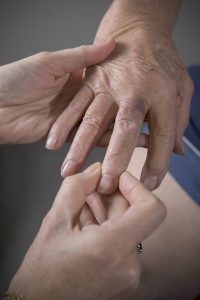Information For Patients Regarding Clinical Trials
We are applying advanced science to the ongoing search for new ways to treat disease, while providing clinical trial participants with top-notch, compassionate care from a team of dedicated healthcare professionals.
Information About Clinical Trials
Is A Clinical Trial Right For You?

In recent years medical science has made great progress in helping to prevent, treat, and cure many diseases. However, there is much work that still needs to be done.
As part of its core mission, the UNC Thurston Arthritis Research Center conducts advanced research to investigate the causes – as well as seek new ways to treat – arthritis, allergies and autoimmune diseases.
Patients who have diseases or conditions for which traditional medicines have not been effective may choose to participate in a clinical trial that investigates new treatment options that might be of benefit for them, or other patients in the future. Before enrolling, interested patients meet with a medical professional to determine if they will benefit from participating in a clinical trial.
In addition to clinical trials, the UNC Thurston Arthritis Research Center also conducts “observational studies,” which involve asking participants questions and monitoring their health status over time – without necessarily testing new treatments.
Patient Safety Is The First Priority
All clinical trials follow a pre-determined study plan, or “protocol,” that ensures the health and safety of the participants. It explains what the study will do, how it will be carried out, and for which types of patients participation is appropriate. All study procedures are rigorously evaluated by our healthcare professionals and the UNC Office of Human Research Ethics.
Why do people typically choose to participate in clinical trials?
People volunteer to participate in clinical trials for many reasons. Two of the most common reasons include:
- They anticipate receiving a personal benefit, such as the possibility of a better treatment or outcome for their condition.
- They wish to benefit others and contribute to the advancement of scientific research.
For more information about clinical trials visit www.clinicaltrials.gov.
Frequently Asked Questions About Clinical Trials:

Q: Is there oversight of clinical trials, either before they start or once they have begun?
A: The health of each participant is the top priority, and is carefully protected throughout the duration of the study. Clinical trials must also be approved by an Institutional Review Board (IRB) before enrolling participants in the study. An IRB is composed of a team of medical professionals who perform critical oversight of the research being conducted throughout the study, in order to ensure the clinical trial is safe for participants and scientifically relevant.
Q: Once I start a clinical trial, can I quit?
A: Participants can drop out of a clinical trial at any time, and for any reason. If you do not like the clinical trial, are not feeling well, or it is not proceeding as you would like it to, you have the option to stop participating.
Q: I understand blood samples are collected during a clinical trial. What are they used for?
A: Blood samples are usually drawn for laboratory tests to assess the progress of participants within a study. They are not used for any purpose that is not specifically stated in the consent forms that patients sign in advance. Sometimes a patient may be asked to donate additional blood samples during a clinical trial to help researchers do things such as develop new laboratory tests for diagnosing and treating diseases. These samples require a separate consent form, and are optional. All samples taken are “de-identified,” meaning the name of the individual is kept confidential.
Q: If my doctor asks me to participate in a clinical trial, I can’t really say no, can I?
A: Participating in a clinical trial is strictly on a voluntary basis; your doctor will still be your doctor and treat you regardless of whether or not you participate. Your decision should not affect the relationship you have with your doctor.
Q: If I participate in a clinical trial, can my insurance company deny me coverage?
A: Participation in a clinical trial should not affect your coverage, as insurance companies are not informed regarding your participation, nor are they informed regarding the outcome of your involvement in the study. There is no charge to the patient for participating in a clinical trial. All study related activities including study visits, blood tests and study medications are free to participants. Most clinical trials offer a stipend to cover travel expenses, parking, and time devoted during the duration of the study.
Q: Is there any benefit to the patients who enroll in a clinical trial?
A: In addition to potentially benefitting from receiving new treatments that are being investigated, patients who enroll are helping to advance scientific research that may help others in the future. Participants receive close, comprehensive health evaluations by the healthcare providers conducting the study, and medicines that might not be otherwise available.